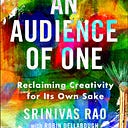How to Think Like a Rocket Scientist
3 min readMay 14, 2020
Ozan Varol is the author of the book Think Like a Rocket Scientist and he joined Srini for a discussion of possibilities, challenging assumptions, thinking based on “the first principles”, dreaming big, testing your ideas and so much more. This episode is inspiring and packed with practical wisdom. Below are our favorite key takeaways.
- Ozan’s father had this excellent mantra that ‘If you want to win the lottery you have to buy a ticket’. That principle helped Ozan embrace the sense of possibility, push the bounds, and explore what is possible.
- Ozan spoke about the immense importance of questioning our assumptions and why we do the things we do. Of course, questioning all assumptions is tedious but questioning a select few has great potential to show us where we are sticking to default and how we can do things differently. When we ask ourselves why we do the things the way we do, the answer is often ‘because everyone else also does it.’ That often keeps us stuck.
- Systems are set up so that they solve the problems that often no longer exist. Questioning why are systems set up the way they are and whether there are some workarounds can give us interesting answers and open up new possibilities.
- We often treat our choices like a one-way sliding door. We think that there is no way back and if we fail, we’ll be stuck or marked forever. The fact of the matter is that most choices can be reversed and ‘failure’ is just a concept in our minds.
- Questioning first principles is an important premise of thinking like a rocket scientist. Ozan shares an interesting story of Elon Musk not being able to purchase ready-made rockets and get them delivered in a timely manner. The solution: he bought parts and materials and made what he needed in his own facilities.
- Doing what everyone else is doing will give us mediocre results and make us blend with everyone else. Ozan shares the example of Tim Urban not following any of the conventional rules of blogging: his posts were super long and delivered in irregular intervals. Yet, high quality and uniqueness made him stand out of the crowd.
- We appreciate answers more than we appreciate questions. Therefore, we are often too fast to settle down with a response. Answers should be treated as new questions and starting points for new discussions and thinking.
- A big trait of successful rocket scientist thinking is the principle of treating successes as failures and failures as successes. Each successful outcome should be carefully investigated to see what could have been done better, what was the result of a skill, and where the luck played the part. Failure should be treated as a learning opportunity. In recent times, failure was glorified by tech culture, yet, a failure that does not result in learning is ineffective.
- Ozan is a fan of the goals that are ‘moonshots’, goals that are bold and that stretch us. Our goals are often safe and cushioned because we are afraid of failure and disappointment. Not everyone has to have goals like Elon Musk, but all of us can benefit from dreams that make us slightly uncomfortable because that’s when we push our limits.
- To be unmistakable, according to Ozan, you must be willing to share your unique ideas and traits that the world is working hard to repress into conformity. The supporting story he shares about Johnny Cash is an excellent example, worth checking out.
Want access to more episode summaries like this one?
Joint The Unmistakable Creative Listeners Tribe. It’s completely free and you’ll get access to dozens of summaries like this one. Click here.
